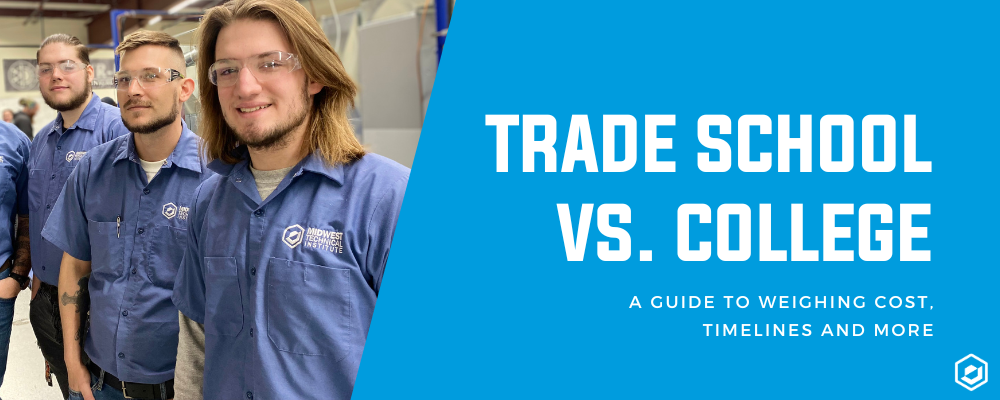The U.S. is facing an unprecedented shortage of workers in the skilled trades. As demand for these roles increases, it’s time to take a deep dive on the reasons to consider a trade school vs college.
Trade School vs College by the Numbers
| Four-Year College, Public | Two-Year College, Public | Trade School | |
| Tuition & Fees | $9,400 (per year) — $37,600 total | $3,900 (per year) — $7,800 total | $3,600 – $16,000 total (estimated) |
| Time to Complete | 4 years | 2 Years | Less than a year (depending on program type) |
| Other Expenses | Books, housing | Books, housing | Typically included within tuition |
| Award | Bachelor’s degree | Associate’s degree | Diploma or certificate of completion |
Source (4-Year and 2-Year; 2020-21 Academic Year): National Center for Education Statistics
Source (Trade School): Indeed; How Much Does Trade School Cost?
Comparing the Cost of Trade School vs College
Whether you’re a recent high school graduate or simply considering a different career path, there’s plenty of financial incentive to go to a trade school instead of college.
While the average cost for tuition and fees at a four-year public college is listed by the National Center for Education Statistics at $9,400 per year, additional costs (such as books, supplies, room and board) can drive that number up significantly. After factoring in interest rates, the total cost of attending a four-year college is substantially higher than average trade school costs.
Meanwhile, the average total cost for trade schools ranges from roughly $3,600 to $16,000 total. While the cost varies greatly based on several factors, including the type of school, the program length, and the type of program, total costs are substantially lower on average for trade schools versus four-year colleges.
It’s also important to consider student loan debt when choosing the right school for you. To earn a bachelor’s degree, public university students borrowed an average of $32,714 (June 2023) — that’s nearly quadruple the average student loan debt of a Midwest Technical Institute (MTI) graduate ($8,471), according to IPEDS Data for Midwest Technical Institute – Illinois.
In recent decades, high school students have been increasingly encouraged to pursue a bachelor’s degree. But according to NPR, the financial return from a bachelor’s degree is softening, while the price and the average debt into which students at 4-year institutions accumulate, remains high. But with increasing costs for four-year colleges, trade school is especially appealing.
Interested in Learning More About MTI?
Fill out the form below to receive info about our career training programs.
Enrolling in Trade School vs College
When compared to the traditional college application process, getting into a trade school is typically a much quicker process. Rather than applying and waiting weeks or months to hear back from a traditional four-year college, most trade school applicants can talk almost immediately with a member of the admissions team. For example, MTI does not require an application as part of the enrollment process. MTI also does not require SAT or ACT scores.
Trade school applicants will learn what qualifications are required to enroll, typically, a high school diploma or equivalent (GED). At MTI, students can enroll in just three easy steps. First, they will meet with a member of the Admissions Team to learn more about our programs and class schedules, next they will take a campus tour, and finally they will meet with a member of the Financial Aid Team to learn what financial aid they may qualify for.
Who should consider trade school instead of college?
Perhaps the two most important factors to keep in mind when weighing trade school vs college is the cost and time commitment you are willing to make for career training. If you’re looking for a faster track to starting a new career and don’t want to assume a lot of student debt, trade school could be a great option.
You can decide how much time you want to spend in school and plan your training accordingly. At MTI, most of our programs will prepare you for entry-level employment in less than a year, so you can start your career as a welder or HVAC/R Technician for example, much faster than taking the 2-year or 4-year college track.
Another important aspect to keep in mind is flexibility. Most trade schools offer classes year-round, which means you don’t have to wait for one semester to end and another to begin before you can start your training. Because many trade schools, like MTI, also offer day and evening classes, it’s easier to fit your schooling in without causing unnecessary disruption to your home and work life.
Another advantage of a trade school over a traditional college is the career-focused training. At most four-year colleges, you’ll be required to take an average of two years of prerequisites before you can start focusing on your major. At MTI, there are no general education courses — all of your training will be specific to the program you choose. MTI also focuses on hands-on training in labs that simulate real working environments, and all of our instructors have real working experience in the field.
What Are Good Trades to Get Into?
Not only are several skilled trades professions in demand, there are many that offer high earning potential. Here are just a few examples:
Electrician
- Work in a variety of settings installing, maintaining and repairing electrical systems.
- Job growth is anticipated to grow 7% through 2031
- Median annual wage of $60,040 in May 2021.
HVAC/R Technician
- People in this skilled trade will experience 5% growth through 2031
- Median yearly earnings of $48,630 in May 2021.
Welder
- Job growth and a median annual wage of around $47,000 in 2021 can make welding a great career choice.
Pipefitter
- With an estimated 9,100 job openings for pipefitters expected through 2031, the career is a promising profession.
- Median annual wage of $59,880 in May 2021.
Truck Driver
- Life on the road could pay off for you. The industry is growing and so are salaries, with an average annual earnings of $48,310 in May 2021.
Why Trade School May be a Better Fit for You Than a Four-Year College
Aside from the lower costs for trade schools, if you like the idea of working with your hands and staying busy, a career in the skilled trades can be a rewarding option.
Compared to four-year colleges, trade schools are also a great choice for visual learners who retain information by seeing and doing. Instead of the majority of education coming from a classroom environment, many trade school programs are more hands-on. MTI’s skilled trades training programs can provide the type of hands-on training students need to enter the workforce with skills and confidence.
Plus, by the time your classmates who attend four-year institutions are graduating, you could be working toward your first promotion in a skilled trade!
Want to learn more about trade school costs, programs, and more? Fill out the form below to connect with the Admissions Team at MTI or schedule a tour of your local campus.
Sources
- https://www.axios.com/2023/03/18/technical-worker-shortage-trade-education-construction
- https://nces.ed.gov/fastfacts/display.asp?id=76#:~:text=At%20public%204%2Dyear%20institutions,2010%E2%80%9311%20(%248%2C500).
- https://www.indeed.com/career-advice/career-development/trade-school-cost
- https://educationdata.org/average-debt-for-a-bachelors-degree
- https://www.npr.org/2023/02/14/1155405249/high-paying-jobs-that-dont-need-a-college-degree-thousands-of-them-are-sitting-e
- https://www.bls.gov/ooh/construction-and-extraction/electricians.htm#tab-6
- https://www.bls.gov/ooh/construction-and-extraction/electricians.htm#tab-1
- https://www.bls.gov/ooh/installation-maintenance-and-repair/heating-air-conditioning-and-refrigeration-mechanics-and-installers.htm#tab-6
- https://www.bls.gov/ooh/installation-maintenance-and-repair/heating-air-conditioning-and-refrigeration-mechanics-and-installers.htm#tab-1
- https://www.bls.gov/ooh/production/welders-cutters-solderers-and-brazers.htm#tab-1
- https://www.bls.gov/ooh/construction-and-extraction/plumbers-pipefitters-and-steamfitters.htm#tab-6
- https://www.bls.gov/ooh/construction-and-extraction/plumbers-pipefitters-and-steamfitters.htm#tab-1
- https://www.bls.gov/ooh/transportation-and-material-moving/heavy-and-tractor-trailer-truck-drivers.htm#tab-1



